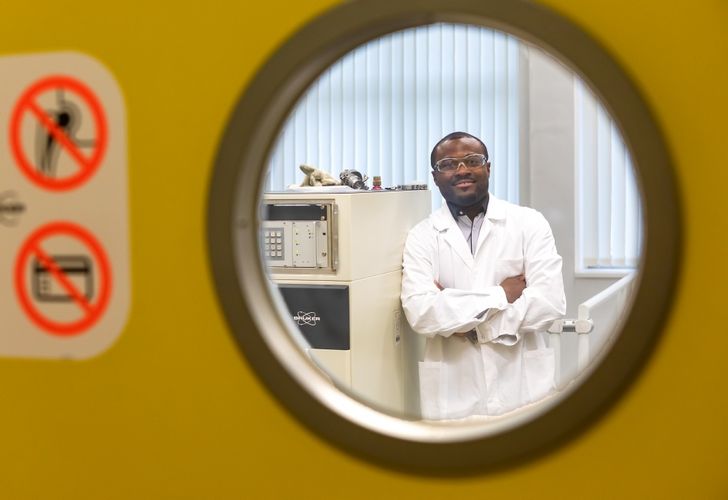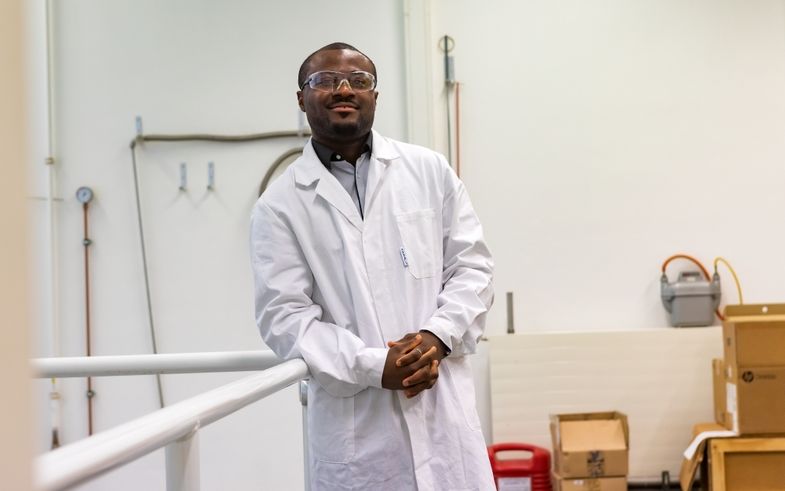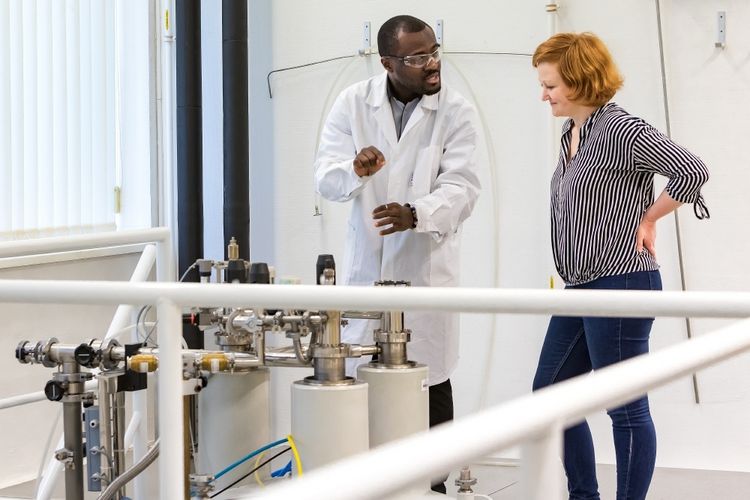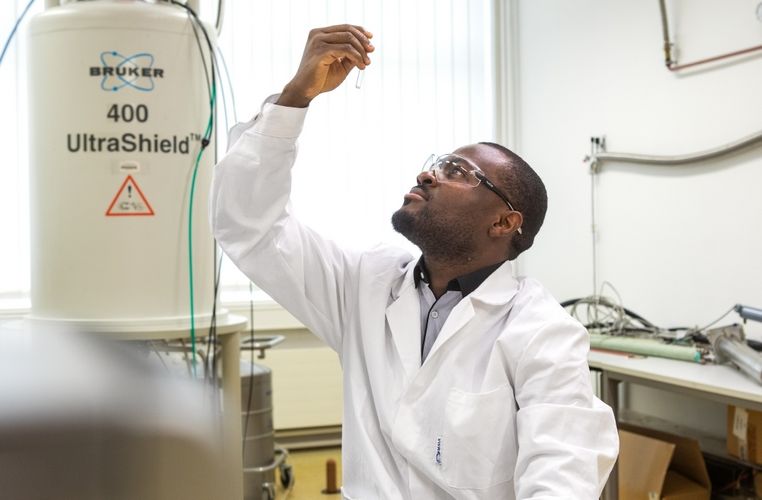Name: Henry Reynolds Nana Benyin Enninful
Alter: 28
Role and field: Research Assistant, Physics
My subject: Advanced thermoporometry characterisation of complex porous solids
What I studied: Engineering (Aerospace and Petroleum)
At Leipzig University since: November 2018
Question: What’s your dissertation about and what do you hope to find out?
Henry Reynolds Nana Benyin Enninful: Many natural processes, ranging from ice formation in clouds, drug delivery to target organs, to cell damage and injury protection, all have one thing in common – porous materials and membranes. Similarly, industrial processes such as catalysis, sensing, adsorption, separations, enhanced oil/gas recovery, greenhouse gas capture and storage and energy storage are but a few of the myriad applications employing the uniqueness of porous materials.
To date, ordered porous materials have mostly been used for many of these purposes because the nano-(physical) processes of matter in them are clearly understood. More challenging is the physics in complex random pore structures, even when the material chemistry has been fully established. Many attempts at understanding how these complex porous materials function have yielded unsatisfactory and at times debatable results. However, when fully understood this complexity promises to optimise the applications of these materials.
My work lies at the interface between material science and fundamental physics. I study the effect of surface chemistry and confinement on fluids. By understanding the gas-liquid and liquid-solid phase equilibria in pore structures, one is able to tell the pore morphology and topology. Specifically, I combine experimental techniques, especially nuclear magnetic resonance (NMR), and computer simulation tools to understand the physics in these complex architectures and effectively characterise them for more meaningful applications. So far, my group has been able to establish a technique which correctly describes all states of fluids in random pores. More work is being done to make this more robust, so as to be able to explain all the varied and seemingly contradictory results obtained by other groups based on the different material synthesis routes. I really expect many interesting results in the near future.
What made you choose this as the subject of your doctorate? What is it that fascinates you?
To be honest, I had to juggle between different fields before settling on my current subject. But the underlying theme that runs through them all is Fluids! While pursuing my bachelor’s programme in Aeronautic Engineering at the Kwame Nkrumah University of Science and Technology (KNUST), Ghana, I was fascinated by the dynamism and uncertainty of fluids. To compound the problem further, fluids become far more difficult to understand when confined in pore spaces. This motivated my master’s programme in Petroleum Engineering at the Politecnico di Torino (PoliTo), Italy, after working at Schlumberger Ghana Limited in wireline and rock-fluid characterisation. I was particularly struck by the inability to recover oil and gas from rocks beyond an efficiency of ~ 40%. I realised the main challenge lay in the insufficient understanding of the complexities of rock matrices. I therefore undertook my master’s thesis at the University of Calgary, Canada as a visiting research student, investigating the characterisation of unconventional oil sources such as oil sands with NMR. I encountered a number of unanswered questions which my thesis couldn’t address during my short stay.
Determined to gain answers to those unanswered questions, I decided to pursue a research career in the same or a similar field. After my master’s programme, I visited Professor Rustem Valiullin’s Applied Magnetic Resonance group here at Leipzig University as an Erasmus+ intern in order to gain further insights into the subject. The group has a long history of producing excellent scientific findings in porous media physics with NMR. Also, it is one of the few groups investigating purely physical phenomena in pores. Though I didn’t study rocks, I worked on general mesoporous materials which have smaller pore sizes than conventional sandstones, but are similar to shales. These mesoporous materials have even more applications than I thought. A deeper understanding of them will provide useful tools for enhanced oil recovery and carbon capture and sequestration.
From November 2018, I began my doctoral programme with the same group and on the same subject. I am deeply convinced of the suitability of the subject because the skills gained are transferable to the broad array of applications I mentioned earlier. This means I will not fall victim to the volatilities of the oil industry. With time, I have become interested in battery research, as I consider it one of the biggest research fields yet, with more to be seen. This is corroborated by plans announced by Germany and France to jointly establish national battery manufacturing plants to complement the booming green technologies in Europe.
Which stumbling blocks, but also highlights, have you encountered so far on your path to a doctorate?
Barely eight months into my doctoral programme, key highlights have been the publication of my first article in Frontiers in Chemistry, with at least three more in preparation and set to be published before the year ends. I have also had the opportunity to present my work at two major conferences and am ready to do the same at the AMPERE NMR Summer School later this June. Another key milestone for me has been my selection to participate in the 69th Lindau Nobel Laureate Meeting in July this year. There, some 560 of the brightest young physicists from all over the world will meet about 40 Nobel laureates to discuss trending topics in physics and the global challenges physics needs to address. As the icing on the cake, I have been selected to participate in a press conference with over 50 journalists on the impact of growing nationalism on scientific collaboration.
All has not been rosy on this journey though. I have encountered huge challenges; above all making the transition from engineering to science. With my strong engineering background, at first I struggled to cope well with the scientific method of problem-solving and analysis. Engineering and science may sound similar, but have many different, notable characteristics. My supervisor had to constantly remind me of my new field and how things work in physics. He has been a great inspiration to me and in my newly found field. Moreover, I lacked certain knowledge in some vital areas, but with the group’s support, I have been able to catch up. I hope to develop these new skills to solve more complex problems in science.
What is next for you after completing your doctorate?
Three major international automobile manufacturers – German carmaker Volkswagen, Japan’s Nissan and China’s Sinotruk – have already agreed to establish assembly plants in Ghana. Renault and Toyota are also conducting feasibility studies to do the same. Given the prevailing understanding of climate change, it is clear there is a paradigm shift towards the use of clean fuels such as hydrogen and electric-powered automobiles. This implies that a constant supply of a variety of efficient and cheaper energy storage options will be needed to produce cheap and affordable vehicles for even the world’s poorest populations. I intend to make a strong case for a battery manufacturing plant in Ghana. By producing top-notch research and mentoring some of the finest battery scientists, coupled with Ghana’s growing business-friendly climate, it should be easier to convince these carmakers to manufacture batteries locally for the African market.
Furthermore, our preparations for the catastrophes accompanying global warming will be stepped up a notch, with a better understanding of ice formation in clouds. With drought, flooding and unreliable rainfall patterns posing effects of climate change, Africa risks being one of the worst victims. More concerted efforts at inhibiting these adverse effects through a deeper understanding of ice formation in clouds is needed.
My dream has always been to expand the frontiers of knowledge while solving the most daunting challenges of mankind. One way to execute this is through knowledge dissemination. In this regard, I intend to spend two to four years as a postdoctoral researcher to investigate ice formations in clouds and efficient methods of battery and gas storage, before returning to Ghana to establish my own research group. I expect to be able to make faster and better progress since my doctorate will provide a sound footing in the fundamental physics needed in these applied areas of physics.
How do you like to spend your free time?
Quite frankly, I have little spare time for myself. When not thinking about the next challenge in the complexities of random porous materials, I am writing scientific articles for Physics World – the flagship magazine of the Institute of Physics (IOP) –, devising business plans or mentoring young men and women who are eager to reach even loftier heights. Alternatively, I may be watching movies to get me refreshed for my next work schedule. It really depends on my mood and/or the urgency at that specific time. On Sundays, I fellowship at generations church Leipzig.
Do you have a motto in life? If so, what is it?
I am generally motivated by the stories of many individuals and groups from diverse spheres of endeavour, who fought through thick and thin, levelled mountains and defied the odds to realise their dreams. To encapsulate the lessons learnt, I have coined a personal life motto: “If your dreams don’t overwhelm you, go back to sleep.” At no point in life should we be comfortable with the number of successes and victories we have. There are always bigger feats to achieve. The stars should always be our springboard.
Interview conducted by Katrin Henneberg.


































































